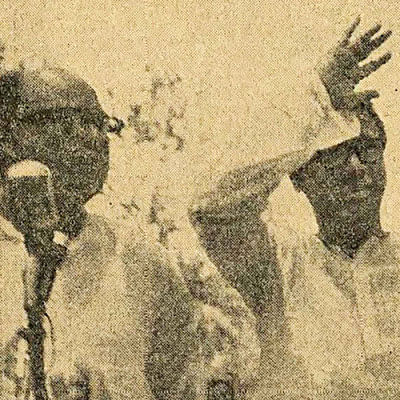Mujibnagar government sworn in

April 17, 1971
MUJIBNAGAR GOVERNMENT TAKES OATH
The independence of Bangladesh was formally proclaimed today at Baidyanathtala, Meherpur. Cabinet members of the provisional government took oath at a ceremony which was conducted by Abdul Mannan MNA, and the proclamation of independence was read out by Professor Mohammad Yusuf Ali. A guard of honour was given to Syed Nazrul Islam, the acting president of the newly formed government.
Sayed Nazrul Islam, and Prime Minister Tajuddin Ahmad appealed for recognition by foreign powers.
Nazrul Islam told a crowd of applauding Bangalees that he was proclaiming the independent Democratic Republic of Bangladesh on behalf of its leader, Bangabandhu Sheikh Mujibur Rahman.
The Indian authorities played a major part in the ceremony, and a contingent of Indian troops was on hand just across the frontier.
The troops of Pakistan's central Government were but 30 miles away.
YAHYA'S LETTER TO NIXON
In a letter dated April 17, 1971, Pakistan President Yahya Khan expressed his gratitude to US President Richard Nixon for the US government's unconditional support to the East Pakistan crisis. He wrote, "I am deeply gratified that your Government has made it clear, to all those who have raised the question, that the United States recognises the current events in East Pakistan as an internal affair, for whose solution the responsibility rests with the Government of Pakistan."
Yahya further informed that the process of transferring power to the elected representatives would be resumed soon.
HOURS OF TERROR FOR A TRAPPED BANGALEE OFFICER
The New York Times today published the following account of a Bangalee army officer, pseudonym Dabir, who escaped brutal killing of Bangalee military men in Comilla Cantonment: On the night of March 25 Dabir recalls, he and the two other Bengali officers in the 53d Field Artillery Regiment were standing outside when they heard their commander tell the West Pakistani officers he had summoned to his office:
"All of you go now to the city, and by morning I want to see the whole of Comilla filled with corpses. If any officer hesitates to do so I'll have no mercy on him."
The three unarmed Bangalee officers were called in and placed under what amounted to house arrest although the commander said they were being given office duties. During the next three days as Dabir and the two others, both captains, answered telephones and shuffled papers under the watch of sentries they heard the sounds of machine‐gun, small‐arms and artillery fire in the distance.
Through a window they saw the 60 Bangalee soldiers of the regiment being taken behind a building, their hands in the air, by West Pakistani troops. Then the three heard a sustained burst of firing and assumed that the Bangalees had been killed.
All pretense was dropped on March 29 and the three officers were locked in a room together. They passed the night in fear.
On the afternoon of March 30, a West Pakistani officer walked up to the door and broke the glass with the barrel of a submachine gun.
One Bangalee captain fell to his knees and begged for mercy. The answer was a burst of fire. The West Pakistani then fired a second burst into the other captain.
Dabir pressed himself against the wall next to the door. The West Pakistani tried the locked door, cursed and went away for the key.
Dabir threw himself under his cot and covered his head with his hands. The man returned. "I shrieked," Dabir said. "He fired. I felt a bullet hit me. I made a noise as if I was dying. He stopped firing thinking I was dead, and went away."
One bullet had struck Dabir's right wrist another had grazed his cheek and a third had ripped his shirt up the back. He rubbed blood from his wrist over his face and held his breath when other officers returned to make sure all three were dead.
The West Pakistanis poked and prodded until they were satisfied. A Punjabi sergeant kicked the bodies of the two captains. Each time Dabir desperately held his breath.
After seven hours Dabir left by the window and dropped four feet to the ground. A sentry heard him and began firing, but it was dark and the shots went wild. Other soldiers in the compound also opened fire, but Dabir made it past the last sentry post, crawled through a rice paddy, swam across a small river and escaped. The next day a doctor removed the bullet from his wrist and bandaged him.
The New York Times reported that Dabir had now joined the forces fighting for the independence of Bangladesh.
Shamsuddoza Sajen is a journalist and researcher. He can be contacted at [email protected]

 For all latest news, follow The Daily Star's Google News channel.
For all latest news, follow The Daily Star's Google News channel. 



Comments